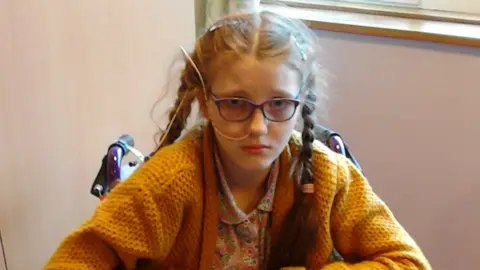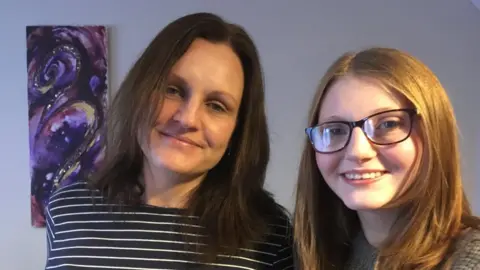'I was accused of pretending that my daughter was sick'
 Nicky Rowlands
Nicky RowlandsIt was a revelation that left Nicky Rowlands aghast - the moment she discovered she was being accused of fabricating the illness that had left her daughter in pain. Worse was to come. Her daughter Bethanie had to go to a hospital unit for a psychological disorder which she did not have.
As a child, Bethanie complained of constant pain when she walked and was often sick after eating or drinking.
Then after a routine tonsillectomy operation in 2014, she stopped eating completely.
"I knew as soon as she'd had the operation, something wasn't right," said Nicky.
"They assumed she had infections, but she couldn't even keep the antibiotics in and they had to feed her through a tube."
Bethanie said: "It hurt so much when I first had the operation, but I don't think anyone expected it to, or knew why.
"I kept on trying to eat and I just got progressively more poorly."
For some time, medical staff looking after Bethanie searched for a diagnosis.
'Fabricated illness'
An explanation Nicky had found through searches on the internet was, she said, laughed away as being extremely rare.
Then the arrival of a letter marked a change in the attitude of doctors.
Nicky was told she was being investigated by social workers for inventing her daughter's symptoms, and Bethanie was to be sent to a psychiatric unit almost 100 miles away, in Southampton, where she stayed for 10 months between 2015 and 2016.
 Nicky Rowlands
Nicky Rowlands "When we received that letter, it was very clear that it wasn't Bethanie they were talking about," Nicky says.
"I flagged it straight away and said 'you have the wrong person'.
"I asked them to check their notes to see if someone else's had got mixed up in it and they said that just doesn't happen."
Nicky was refused access to the notes, as the child protection wheels were then in motion.
Social workers thought Nicky was displaying Fabricated or Induced Illness (FII) - what used to be known as Munchausen by Proxy - where parents deliberately make their children ill.
Nicky's was one of 12 families in Gloucestershire suspected of having invented their children's symptoms. These cases have been looked at by a social worker and all the allegations of FII have now been dropped.
The allegations against Nicky began to unravel when she finally got Bethanie's medical notes.
Wrong girl
"All of a sudden it was like reading something from a different author. I read back the page before and said 'we must find a medical reason for Bethanie's issues'.
"Then all of a sudden it started talking about all of these symptoms she had never had," Nicky explains.
She realised that another girl's name was on the notes - and this girl had an eating disorder, had self-harmed and was withdrawing from an addiction to painkillers.
Gloucestershire Clinical Commissioning Board, Gloucestershire Hospitals NHS Trust and Gloucestershire County Council would not comment on Bethanie's case, but, in a joint response to the report, they said they would review their processes and staff training, and would welcome feedback and input from parents.
 Nicky Rowlands
Nicky RowlandsTheir spokesperson said: "Fabricated or Induced Illness is a complex area, and, whilst it is uncommon, when it is suspected, we work swiftly with our health and social care partners to ensure that children are kept safe - their welfare being of paramount importance.
"In such instances, we consider all the information available, with considerable emphasis on reaching professional consensus and acting appropriately in line with our protocol for jointly investigating suspected FII."
University Hospital Southampton NHS Trust said the mix-up of notes in Gloucestershire did not influence the clinical care she received at its children's unit, and an investigation found no further action was required.
In Nicky's case, the suspicion ended when she finally received a diagnosis for Bethanie.
Her daughter was suffering from the condition she thought she had identified before Bethanie was sent away: Ehlers-Danlos Syndrome, a rare illness which can cause joint hypermobility, extreme tiredness and digestive problems.
While she is now back with her family, 15-year-old Bethanie knows she has a lifelong condition which means she will be fed by tube.
And Nicky feels the best years of her daughter's life have been ruined.
Nicky also had to give up her job because of the circumstances in which she and her daughter found themselves.
"Bethanie lost four years of her life, she lost the rest of her childhood, and I've lost my life savings," she said.
You can hear 5 Live Investigates on BBC Sounds.
